 |
My Wife Is Eighteen (2002) |
 |
 |
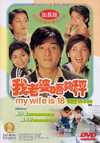
 After finished the open examination for Form 5 students and applied for an adult identity card, Yoyo, eighteen, departed for London immediately to meet a guy introduced by her earnest parents living in Britain. The guy, named Cheung, is in his thirty. Yoyo's and Cheung's grandfathers were wartime buddies. They swore to have their unborn babies got married when they grew up. However, the babies turned out to be both women. The two women are now mothers. They come across each other again and want to make their fathers wish come true, so they arrange the acquaintance of Yoyo and Cheung in London. Yoyo and Cheung promised to get marry in order to please their mothers. But on the wedding day, they also sign a divorce agreement which is effective one year after their marriage. After finished the open examination for Form 5 students and applied for an adult identity card, Yoyo, eighteen, departed for London immediately to meet a guy introduced by her earnest parents living in Britain. The guy, named Cheung, is in his thirty. Yoyo's and Cheung's grandfathers were wartime buddies. They swore to have their unborn babies got married when they grew up. However, the babies turned out to be both women. The two women are now mothers. They come across each other again and want to make their fathers wish come true, so they arrange the acquaintance of Yoyo and Cheung in London. Yoyo and Cheung promised to get marry in order to please their mothers. But on the wedding day, they also sign a divorce agreement which is effective one year after their marriage.
 It's fantastic for the interaction between Ekin Cheng and Charlene Choi (from girl band Twins) and the generation conflict that ensues. Ekin plays a 30-year-old old boy who's not fortunate in love and Charlene is a young overexcited and childish girl. She indeed is 18-year-old going on 12.
The story is just a pretext to an amusing confrontation between the leads and at least it provides enough laugh for the 90 minute running time. It's fantastic for the interaction between Ekin Cheng and Charlene Choi (from girl band Twins) and the generation conflict that ensues. Ekin plays a 30-year-old old boy who's not fortunate in love and Charlene is a young overexcited and childish girl. She indeed is 18-year-old going on 12.
The story is just a pretext to an amusing confrontation between the leads and at least it provides enough laugh for the 90 minute running time.
|
 |
 |
Thomas Podvin 1/15/2003 - top |
 |
 |
Mummy Aged 19 (2002) |
 |
 |
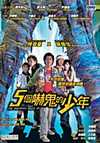
 When a man accepts a job as a security guard at an old mansion, he gets more than he bargained for. Snooping around, he discovers a mummy in the basement, and accidentally upsets it. He wakes up the following morning to find that the mummy has cursed him. When a man accepts a job as a security guard at an old mansion, he gets more than he bargained for. Snooping around, he discovers a mummy in the basement, and accidentally upsets it. He wakes up the following morning to find that the mummy has cursed him.
 As the title indicates, it deals with mummies from ancient Egypt. They are woken up by a bunch of youngsters (boy band Shine and Tiffany Lee). The movie starts pretty well with a good depiction of original characters, but it eventually fails to deliver the goods. The final act is neither scary nor funny, just cute to look at…
It's another half-achieved effort from director Wilson Yip who's been much more inspired with Bullets Over Summer and Juliet In Love. As the title indicates, it deals with mummies from ancient Egypt. They are woken up by a bunch of youngsters (boy band Shine and Tiffany Lee). The movie starts pretty well with a good depiction of original characters, but it eventually fails to deliver the goods. The final act is neither scary nor funny, just cute to look at…
It's another half-achieved effort from director Wilson Yip who's been much more inspired with Bullets Over Summer and Juliet In Love.
|
 |
 |
Thomas Podvin 1/15/2003 - top |
 |
 |
Love Undercover (2002) |
 |
 |

 Fong graduates from Police School; but her poor performance limits her to trivial jobs in the station. When eventually she is assigned an important task--posing as a waitress to plant a bug on a suspect--things go awry, and the plan is put in jeopardy... (hkflix) Fong graduates from Police School; but her poor performance limits her to trivial jobs in the station. When eventually she is assigned an important task--posing as a waitress to plant a bug on a suspect--things go awry, and the plan is put in jeopardy... (hkflix)
 Director Joe Ma recycled the character of LK Fung who fakes pregnancy in Dummy Mommy, Without A Baby. The setting here is a police station and LK Fung (Miriam Yeung) is a young policewoman who is extremely clumsy. She's sent undercover by a bunch of cops who aren't much better. She obviously makes a mess by falling in love with the target, the son of a former kingpin. Situation comedy, nonsense and great second roles add a spicy touch to this fresh but dispensable comedy. Director Joe Ma recycled the character of LK Fung who fakes pregnancy in Dummy Mommy, Without A Baby. The setting here is a police station and LK Fung (Miriam Yeung) is a young policewoman who is extremely clumsy. She's sent undercover by a bunch of cops who aren't much better. She obviously makes a mess by falling in love with the target, the son of a former kingpin. Situation comedy, nonsense and great second roles add a spicy touch to this fresh but dispensable comedy.
|
 |
 |
Thomas Podvin 1/15/2003 - top |
 |
 |
Just One Look (2002) |
 |
 |
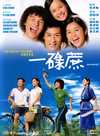
 Fan's father brings him to a movie and is found dead of a gunshot wound in the theater bathroom. Fan then swears to go after his father's murderer. When he turns seventeen, he and his best friend Ming--who's also obsessed with movies--both fall for a kung fu master's daughter, Nam, but Fan chooses to leave. Fan soon meets Yew, who lives alone at the mountainside. Through letters and stories of films, Fan encourages Yew's curiosity of the outside world. But when will he resolve his unfinished business with his father's killer? Fan's father brings him to a movie and is found dead of a gunshot wound in the theater bathroom. Fan then swears to go after his father's murderer. When he turns seventeen, he and his best friend Ming--who's also obsessed with movies--both fall for a kung fu master's daughter, Nam, but Fan chooses to leave. Fan soon meets Yew, who lives alone at the mountainside. Through letters and stories of films, Fan encourages Yew's curiosity of the outside world. But when will he resolve his unfinished business with his father's killer?
 It's a movie on the golden years of HK cinema with a great cast (Twins, Anthony Wong, Shawn Yu & Sam Lee). It's basically based on nostalgia of the old movies. The film doesn't however makes a great use of these films or doesn't state any interesting point of view on what has been the cinema at that time. All in all, it's an original setting for two non-original and dull love stories. It's a movie on the golden years of HK cinema with a great cast (Twins, Anthony Wong, Shawn Yu & Sam Lee). It's basically based on nostalgia of the old movies. The film doesn't however makes a great use of these films or doesn't state any interesting point of view on what has been the cinema at that time. All in all, it's an original setting for two non-original and dull love stories.
|
 |
 |
Thomas Podvin 1/15/2003 - top |
 |
 |
Demi-haunted (2002) |
 |
 |

 Buster (Eason Chan) is a bit player in a Chinese Opera troupe who is contacted/possessed/harassed by the ghost of a woman who died performing on stage. She comedically badgers him into helping her tie up some loose ends. Buster (Eason Chan) is a bit player in a Chinese Opera troupe who is contacted/possessed/harassed by the ghost of a woman who died performing on stage. She comedically badgers him into helping her tie up some loose ends.
 The story deals with a young Cantonese opera performer (Eason Chan) forced by a ghost (Joey Yung) to accomplish her last wish in order to join her past lover (Nicholas Tse). Moleitau humour, opera and drama are the main ingredients of this demi-amusing and demi-convincing movie. The story deals with a young Cantonese opera performer (Eason Chan) forced by a ghost (Joey Yung) to accomplish her last wish in order to join her past lover (Nicholas Tse). Moleitau humour, opera and drama are the main ingredients of this demi-amusing and demi-convincing movie.
|
 |
 |
Thomas Podvin 1/15/2003 - top |
 |
 |
Shark Busters (2002) |
 |
 |
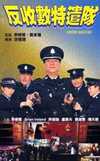
 Danny Lee is back in a cop-of-the-town movie, a genre he's been associated with in the eighties (see Final Jusrtice, Law With Two Faces and so on). He still has his same old habits of bending the law and pressurising gangsters. The context of the economic crisis, however, gives this good-cop story a new and original setting. Everyone has speculated and is in debts, even the members of police forces. Danny Lee is the rare one not to be in debts but he's bound to live on HK$ 2800 per month as he keeps repeating. After being mistreated by loan sharks, his fellow cops finally decide to get the culprits with officious means, ruining them by making them pay a fortune for their bail and lawyer fees and by stealing the debtor files. The story is funny and touching although the first half of the movie is slow-paced. If the current situation of HK households were only half the situation depicted in the film, it would still be highly worrying. Danny Lee is back in a cop-of-the-town movie, a genre he's been associated with in the eighties (see Final Jusrtice, Law With Two Faces and so on). He still has his same old habits of bending the law and pressurising gangsters. The context of the economic crisis, however, gives this good-cop story a new and original setting. Everyone has speculated and is in debts, even the members of police forces. Danny Lee is the rare one not to be in debts but he's bound to live on HK$ 2800 per month as he keeps repeating. After being mistreated by loan sharks, his fellow cops finally decide to get the culprits with officious means, ruining them by making them pay a fortune for their bail and lawyer fees and by stealing the debtor files. The story is funny and touching although the first half of the movie is slow-paced. If the current situation of HK households were only half the situation depicted in the film, it would still be highly worrying.
|
 |
 |
Thomas Podvin 1/15/2003 - top |
 |
 |
Runaway Pistol (2002) |
 |
 |
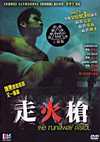
 Guns don't kill people, people kill people. Is that so? But guns sure make people trigger-happy, like power readily fills people with the urge to abuse it. The runaway pistol, which has a life of its own, travels from the underbelly of Mongkok to seedy Shenzhen across the border. It finds its way into the hands of a motley crowd of characters, and claims the lives of a sex worker, a small-time hood, troubled teenagers, and innocent and not-so-innocent bystanders, in manners absurd and inglorious. In his debut as director, Lam Wah Chuen, long-time collaborator of Fruit Chan as cinematographer and composer, fashions a one-of-a-kind road movie that is a complex kaleidoscope of images, and with an intensity bordering on the subversive and the unreal. A cruel fairy tale about a city on the verge of moral meltdown. Guns don't kill people, people kill people. Is that so? But guns sure make people trigger-happy, like power readily fills people with the urge to abuse it. The runaway pistol, which has a life of its own, travels from the underbelly of Mongkok to seedy Shenzhen across the border. It finds its way into the hands of a motley crowd of characters, and claims the lives of a sex worker, a small-time hood, troubled teenagers, and innocent and not-so-innocent bystanders, in manners absurd and inglorious. In his debut as director, Lam Wah Chuen, long-time collaborator of Fruit Chan as cinematographer and composer, fashions a one-of-a-kind road movie that is a complex kaleidoscope of images, and with an intensity bordering on the subversive and the unreal. A cruel fairy tale about a city on the verge of moral meltdown.
 It's an independent and provocative movie produced by Andy Lau's production company Team Work and Andrew Lau. The story is told from the point of view of a gun made in the thirties and that still kills people around. The gun passes from a hand to another travelling from HK to Mainland China. Each day, when it is on the market and still potentially dangerous, is punctuated by the 'funny fish tank' show on TV. HK and China are apparently filled with ferocious animals: pimps, whores, punks, a husband beating up his wife, another one killing his wife's lover, child kidnappers. Nobody is safe, since even the lady who's used to report on TV with a smile the worst atrocities is involved.
The well-written script, the gritty look of all, the pounding music and an average but still good enough production value prolong the suspense all the way. Runaway Pistol is a dark and pessimistic film far from the yuppie preoccupations constantly showed in many HK movies. Director Lam Wah-chuen proposes an uncompromising point of view on some people whose moral and principle have been worn thin or put to the test. The overexcited bunch realises that the gun is indeed an attractive tool to gain power or a useful mean to quickly resolve problems. But by showing exclusively weak and selfish and amoral people, the director just implies that there is only this type of person left in HK.
Some HK directors took part to the movie as actors, such as Soi Cheang and Wilson Yip. It's an independent and provocative movie produced by Andy Lau's production company Team Work and Andrew Lau. The story is told from the point of view of a gun made in the thirties and that still kills people around. The gun passes from a hand to another travelling from HK to Mainland China. Each day, when it is on the market and still potentially dangerous, is punctuated by the 'funny fish tank' show on TV. HK and China are apparently filled with ferocious animals: pimps, whores, punks, a husband beating up his wife, another one killing his wife's lover, child kidnappers. Nobody is safe, since even the lady who's used to report on TV with a smile the worst atrocities is involved.
The well-written script, the gritty look of all, the pounding music and an average but still good enough production value prolong the suspense all the way. Runaway Pistol is a dark and pessimistic film far from the yuppie preoccupations constantly showed in many HK movies. Director Lam Wah-chuen proposes an uncompromising point of view on some people whose moral and principle have been worn thin or put to the test. The overexcited bunch realises that the gun is indeed an attractive tool to gain power or a useful mean to quickly resolve problems. But by showing exclusively weak and selfish and amoral people, the director just implies that there is only this type of person left in HK.
Some HK directors took part to the movie as actors, such as Soi Cheang and Wilson Yip.
|
 |
 |
Thomas Podvin 1/15/2003 - top |
 |
 |
July Rhapsody (2002) |
 |
 |
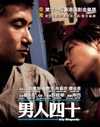
 This is a nice new feature film from director Ann Hui. She made Visible Secret before, a commercial standard ghost movie. There are obviously contrasts between the two movies. July Rhapsody has well written characters (with solid performances from by Jacky Cheung, Anita Mui and Karena Lam). On top of that, Ann Hui's mise-en-scene is sober, with no excessive camera work or face-paced editing.
July Rhapsody deals with a middle age teacher (Jacky Cheung) who starts to wonder about what he's been doing so far in his life and if it actually did worth it. He thinks he falls for one of his students or maybe it's only an excuse to change his everyday life. All is life has been built on lies, hatred and the unsaid. The 17-year old forbidden fruit (Karena Lam) is wicked. She wants to make him fall for her and she's dying to consummate their relationship. The teacher takes the opportunity to gather some courage to change things.
Ann Hui only tells a very realistic story with remarkable restraint. July Rhapsody has a bitter taste for the unanswered questions on generation gap it raises and for the portrait of a man retrospectively assessing his own life. The movie is then deeply touching and for this reason it is probably the best drama of 2002, or at least it deserves to be watched by any fans of HK cinema. This is a nice new feature film from director Ann Hui. She made Visible Secret before, a commercial standard ghost movie. There are obviously contrasts between the two movies. July Rhapsody has well written characters (with solid performances from by Jacky Cheung, Anita Mui and Karena Lam). On top of that, Ann Hui's mise-en-scene is sober, with no excessive camera work or face-paced editing.
July Rhapsody deals with a middle age teacher (Jacky Cheung) who starts to wonder about what he's been doing so far in his life and if it actually did worth it. He thinks he falls for one of his students or maybe it's only an excuse to change his everyday life. All is life has been built on lies, hatred and the unsaid. The 17-year old forbidden fruit (Karena Lam) is wicked. She wants to make him fall for her and she's dying to consummate their relationship. The teacher takes the opportunity to gather some courage to change things.
Ann Hui only tells a very realistic story with remarkable restraint. July Rhapsody has a bitter taste for the unanswered questions on generation gap it raises and for the portrait of a man retrospectively assessing his own life. The movie is then deeply touching and for this reason it is probably the best drama of 2002, or at least it deserves to be watched by any fans of HK cinema.
|
 |
 |
Thomas Podvin 1/15/2003 - top |
 |
 |
Inner Senses (2002) |
 |
 |
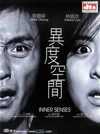
 This film has a great production value very close to international or Hollywood standards. Formally, it doesn't contain very much of the HK style. The photography is down to earth and stylish but the editing and framing are consensual enough not to perplex an international audience. Story-wise, this is a ghost story full of suspense. The approach to super-natural phenomenon is original: it is neither a typical Chinese ghost story nor a real Sixth Sense duplicate. In this respect, the ambiguity between phantasms and reality, served by a first-class cast (Leslie Cheung & Karena Lam), makes it breathtaking all the way. This film has a great production value very close to international or Hollywood standards. Formally, it doesn't contain very much of the HK style. The photography is down to earth and stylish but the editing and framing are consensual enough not to perplex an international audience. Story-wise, this is a ghost story full of suspense. The approach to super-natural phenomenon is original: it is neither a typical Chinese ghost story nor a real Sixth Sense duplicate. In this respect, the ambiguity between phantasms and reality, served by a first-class cast (Leslie Cheung & Karena Lam), makes it breathtaking all the way.
|
 |
 |
Thomas Podvin 1/15/2003 - top |
 |
 |
Infernal Affairs (2002) |
 |
 |
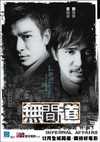
 Ming (Andy Lau) and Yan (Tony Leung) are moles for the police department and the Triads respectively. With the help of his Triad boss Sam (Eric Tsang), Ming now has high hope of being promoted to probationary inspector. On the other hand, Yan is now a Red Pole in the Triads and his immediate boss is none other than Sam. Leading parallel lives, Ming and Yan are feeling increasingly trapped in their false surroundings. Wobbling in the inferno between the living and the dead, they are desperate to find a way out. Ming (Andy Lau) and Yan (Tony Leung) are moles for the police department and the Triads respectively. With the help of his Triad boss Sam (Eric Tsang), Ming now has high hope of being promoted to probationary inspector. On the other hand, Yan is now a Red Pole in the Triads and his immediate boss is none other than Sam. Leading parallel lives, Ming and Yan are feeling increasingly trapped in their false surroundings. Wobbling in the inferno between the living and the dead, they are desperate to find a way out.
 This is probably the best thriller made in 2002 and not only because there were actually very few thrillers produced this year! The film, obviously made for international markets, gathers the best cast and crew that the HK movie industry could possibly offer (Nansun Shi, Chris Doyle, The Pang Bros.). Brilliant lead actors are supported by very experienced second roles. Not only Tony Leung Chiu-wai is at his best, but Eric Tsang and Anthony Wong performances are impressive for their depth and restraint as well. In addition to that, the script is well written, complicated at time but never confusing.
All above points should contribute to make Infernal Affairs a masterpiece. The highest expectations are legitimate but it unfortunately fails to be that great. It's however beautiful, clever at time and even thrilling. The over-stylised aesthetic certainly gives an undeniable value to the movie, but it doesn't always serve the film discourse as a whole. Infernal Affairs is however not a beautiful empty shell, since a few shots are truly brilliant and meaningful (Christopher Doyle is the visual consultant).
Two scenes make the film worth watching. The first one is when Anthony Wong is shot in a lobby under very bright and cold white lights. His two-coloured aspect (black & white) illustrates well that he is straightforward and cold-blooded. He keeps his self-control under any circumstances, as he'll demonstrate to the end. Shots of the undercover Tony Leung in the sun-lighted roof are equally magnificent. The deep focus composition used reveals spaces, pushes forward the walls and diminishes the legendary narrowness of HK. Not only it cleverly expresses the will of Tony Leung to reach light and freedom, but also the desire of the filmmakers to stretch the HK space and to open the film industry to the West. This is probably the best thriller made in 2002 and not only because there were actually very few thrillers produced this year! The film, obviously made for international markets, gathers the best cast and crew that the HK movie industry could possibly offer (Nansun Shi, Chris Doyle, The Pang Bros.). Brilliant lead actors are supported by very experienced second roles. Not only Tony Leung Chiu-wai is at his best, but Eric Tsang and Anthony Wong performances are impressive for their depth and restraint as well. In addition to that, the script is well written, complicated at time but never confusing.
All above points should contribute to make Infernal Affairs a masterpiece. The highest expectations are legitimate but it unfortunately fails to be that great. It's however beautiful, clever at time and even thrilling. The over-stylised aesthetic certainly gives an undeniable value to the movie, but it doesn't always serve the film discourse as a whole. Infernal Affairs is however not a beautiful empty shell, since a few shots are truly brilliant and meaningful (Christopher Doyle is the visual consultant).
Two scenes make the film worth watching. The first one is when Anthony Wong is shot in a lobby under very bright and cold white lights. His two-coloured aspect (black & white) illustrates well that he is straightforward and cold-blooded. He keeps his self-control under any circumstances, as he'll demonstrate to the end. Shots of the undercover Tony Leung in the sun-lighted roof are equally magnificent. The deep focus composition used reveals spaces, pushes forward the walls and diminishes the legendary narrowness of HK. Not only it cleverly expresses the will of Tony Leung to reach light and freedom, but also the desire of the filmmakers to stretch the HK space and to open the film industry to the West.
|
 |
 |
Thomas Podvin 1/15/2003 - top |
 |
|

|
